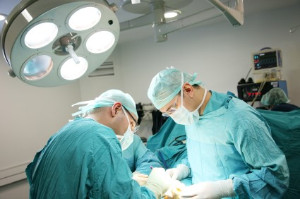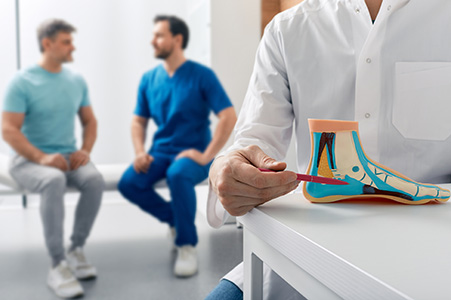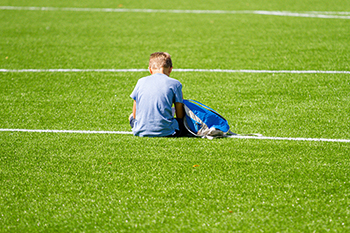Freehold (732) 294-9393
Freehold (732) 294-9393

A bunion is a bony bump that forms at the base of the big toe as the top of toe to angles inward toward the other smaller toes. This deformity often results from inherited foot structure, wearing improper footwear, or medical conditions like arthritis. Over time, bunions can lead to pain, swelling, and difficulty walking. When conservative treatments fail to relieve symptoms, bunion surgery may be recommended to correct the alignment and relieve discomfort. Recovery from bunion surgery involves rest, elevation, and wearing a special shoe to protect the foot during healing. Swelling may last for several weeks, and, with proper care, most individuals can return to normal activities. If you have a bunion that is causing you pain, it is suggested that you confer with a podiatrist who can determine if this type of foot surgery is right for you.
Foot surgery is sometimes necessary to treat a foot ailment. To learn more, contact Dr. Henry Miller of New Jersey. Our doctor will assist you with all of your foot and ankle needs.
When Is Surgery Necessary?
Foot and ankle surgery is generally reserved for cases in which less invasive, conservative procedures have failed to alleviate the problem. Some of the cases in which surgery may be necessary include:
What Types of Surgery Are There?
The type of surgery you receive will depend on the nature of the problem you have. Some of the possible surgeries include:
Benefits of Surgery
Although surgery is usually a last resort, it can provide more complete pain relief compared to non-surgical methods and may allow you to finally resume full activity.
Surgical techniques have also become increasingly sophisticated. Techniques like endoscopic surgery allow for smaller incisions and faster recovery times.
If you have any questions please feel free to contact our office located in Freehold, NJ . We offer the newest diagnostic and treatment technologies for all your foot and ankle needs.

Podiatry is a branch of medicine focused on the diagnosis, treatment, and prevention of conditions affecting the feet and lower limbs. A podiatrist is a healthcare professional trained to manage a wide range of foot-related issues, offering both medical and surgical care. Common conditions treated by podiatrists include corns, which are thickened areas of skin caused by pressure or friction, and verrucas, which are warts on the soles of the feet caused by a viral infection. They also manage structural problems such as flat feet, which can lead to discomfort and imbalance, and heel pain, often linked to conditions like plantar fasciitis. For ingrown toenails that become painful or infected, podiatrists may perform a partial nail avulsion to relieve symptoms and prevent recurrence. If you have foot pain, it is strongly suggested that you promptly contact a podiatrist who can determine what the cause is, and offer effective treatment solutions.
If you are experiencing pain in the feet or ankles, don’t join the stubborn majority refusing treatment. Feel free to contact Dr. Henry Miller from New Jersey. Our doctor can provide the care you need to keep you pain-free and on your feet.
What Is a Podiatrist?
Someone would seek the care of a podiatrist if they have suffered a foot injury or have common foot ailments such as heal spurs, bunions, arch problems, deformities, ingrown toenails, corns, foot and ankle problems, etc.
Podiatric Treatment
A podiatrist will treat the problematic areas of the feet, ankle or lower leg by prescribing the following:
A common podiatric procedure a podiatrist will use is a scanner or force plate which will allow the podiatrist to know the designs of orthotics. Patients are then told to follow a series of tasks to complete the treatment. The computer will scan the foot a see which areas show weight distribution and pressure points. The podiatrist will read the analysis and then determine which treatment plans are available.
If you have any questions please feel free to contact our office located in Freehold, NJ . We offer the newest diagnostic and treatment technologies for all your foot and ankle needs.

Field hockey is a fast-paced sport played on turf or grass, where players use curved sticks to hit a ball toward the opposing team’s goal. Popular worldwide, the sport demands quick movements, sudden stops, and rapid direction changes, all of which put players at risk for ankle sprains. Ankle sprains happen when the foot twists awkwardly, overstretching or tearing ligaments. In field hockey, this can occur from cutting movements, uneven playing surfaces, or accidental contact with another player’s stick or foot. Other common foot and ankle injuries in this sport include fractures, tendonitis, and turf toe, often caused by wearing improper footwear, and the high-impact nature of the game. Wearing supportive shoes, strengthening the ankle muscles, and taping or bracing weak ankles can help prevent injuries. If you enjoy playing field hockey and have sustained a foot or ankle injury, it is suggested that you see a podiatrist for appropriate treatment.
Sports related foot and ankle injuries require proper treatment before players can go back to their regular routines. For more information, contact Dr. Henry Miller of New Jersey. Our doctor can provide the care you need to keep you pain-free and on your feet.
Sports Related Foot and Ankle Injuries
Foot and ankle injuries are a common occurrence when it comes to athletes of any sport. While many athletes dismiss the initial aches and pains, the truth is that ignoring potential foot and ankle injuries can lead to serious problems. As athletes continue to place pressure and strain the area further, a mild injury can turn into something as serious as a rupture and may lead to a permanent disability. There are many factors that contribute to sports related foot and ankle injuries, which include failure to warm up properly, not providing support or wearing bad footwear. Common injuries and conditions athletes face, including:
Sports related injuries are commonly treated using the RICE method. This includes rest, applying ice to the injured area, compression and elevating the ankle. More serious sprains and injuries may require surgery, which could include arthroscopic and reconstructive surgery. Rehabilitation and therapy may also be required in order to get any recovering athlete to become fully functional again. Any unusual aches and pains an athlete sustains must be evaluated by a licensed, reputable medical professional.
If you have any questions please feel free to contact our office located in Freehold, NJ . We offer the newest diagnostic and treatment technologies for all your foot and ankle needs.